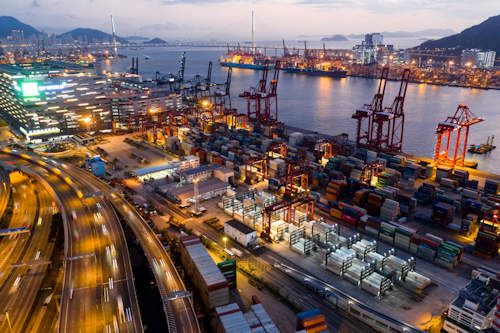South Korean Shipbuilding Giant HD Hyundai Heavy Industries Lands Major LNG Carrier Contract

In a monumental move signifying South Korea’s prowess in shipbuilding, the renowned HD Hyundai Heavy Industries has clinched a contract to construct two state-of-the-art liquefied natural gas (LNG) carriers. Valued at approximately $530 million, this development further strengthens the nation’s footprint in the maritime industry.
* Please send feedback/suggestions to editor @ shipuniverse.com
A Noteworthy Development for Hyundai Heavy
Announced on Thursday, HD Korea Shipbuilding & Offshore Engineering disclosed that its subsidiary, HD Hyundai Heavy Industries, has been given the green light to fabricate two 174,000-cbm LNG vessels. In a testament to South Korea’s growing trade relationship with Africa, the vessels are earmarked for an undisclosed owner based in the continent. The delivery timeline has been set for November 2027.
Perhaps what makes this deal even more striking is the financials. Clocking in at 679 billion won, or roughly $265 million per vessel, it is the record price for a single 174,000-cbm LNG carrier.
The Greek Connection: Evalend Shipping
While KSOE held back on revealing further details regarding this significant order, sources from the shipbuilding industry have indicated that the esteemed Greece-based Evalend Shipping is the entity commissioning these LNG carriers. With no LNG carriers currently under its banner, this move symbolizes Evalend Shipping’s ambitious foray into the burgeoning LNG sector.
KSOE’s Stellar Year
2020 has undoubtedly been a banner year for KSOE and its affiliates. Together, they have amassed orders for an impressive 116 ships, amounting to a staggering $15.26 billion. This encompasses 20 LNG carriers, solidifying their reputation as industry leaders in this niche segment.
With this influx of contracts, KSOE is inching tantalizingly close to its annual financial target of $15.7 billion. Earlier in the year, Hyundai Samho was awarded a contract for two LNG carriers approximated at $523 million. Meanwhile, Hyundai Heavy secured two contracts in May, valued at about $1.6 billion, for the construction of six LNG carriers.
LNG-Powered Commercial Vessels: Navigating a Greener Future
In the vast expanse of the maritime industry, the echoing call for sustainability is being answered in numerous ways. One of the most promising responses is the adoption of Liquefied Natural Gas (LNG) as a fuel source for commercial vessels. With the global push for cleaner energy, LNG stands out as a beacon for a sustainable maritime future. Here are the top benefits of LNG-powered commercial vessels.
1. Environmental Excellence
- Reduction in Greenhouse Gases: LNG has a significantly lower carbon content than conventional marine fuels, leading to a direct reduction in CO2 emissions by up to 25%.
- Decreased Air Pollutants: LNG virtually eliminates sulphur oxide emissions and cuts nitrogen oxide emissions by up to 90%. Furthermore, it results in a 100% reduction in particulate matter, contributing to cleaner air.
2. Economic Efficiency
- Cost-Effective in the Long Run: With the fluctuating prices of oil, LNG offers a competitive pricing structure. As the infrastructure for LNG refuelling expands globally, it’s anticipated that the fuel will become even more cost-effective.
- Extended Engine Life: LNG burns cleaner, which means less engine residue and a potential for extended engine life and reduced maintenance costs.
3. Energy Density and Performance
- High Energy Density: Despite having a lower energy density by volume compared to diesel, when considering its weight, LNG’s energy density is quite competitive. This means vessels can travel similar distances without frequent refuelling.
- Engine Performance: Modern engines designed specifically for LNG often deliver a smoother operational performance with fewer vibrations and less noise.
4. Enhanced Safety Measures
- Low Risk of Spillage: In its liquid form, LNG doesn’t have the same spill risks as oil. If there’s a breach, LNG will vaporize and dissipate, reducing the potential environmental impact.
- High Ignition Temperature: LNG has a higher ignition temperature than conventional fuels, and in its vapor form, it’s only flammable within a specific concentration range, which enhances safety.
5. Regulatory and Future-Proofing Benefits
- Meeting Global Standards: With stricter emission standards being rolled out by organizations like the International Maritime Organization (IMO), LNG-powered vessels are better positioned to meet these regulations without the need for costly retrofitting.
- Future-Proofing Investments: As the world leans more towards green energy solutions, investing in LNG-powered vessels ensures businesses stay ahead of the curve, prepared for a future where carbon neutrality and sustainability are paramount.
The switch to LNG-powered commercial vessels is not just a fleeting trend. It represents a conscientious shift in the maritime industry, aligning commercial needs with global environmental goals. As the infrastructure continues to evolve and adapt, LNG stands poised to play a pivotal role in the green maritime revolution, offering a viable path for the industry to sail towards a more sustainable horizon.

Do you have a Maritime Product or Service that may be of interest to Shipowners? Tell us about it here!
Do you have feedback or insights? Please reach out to editor @ shipuniverse.com



